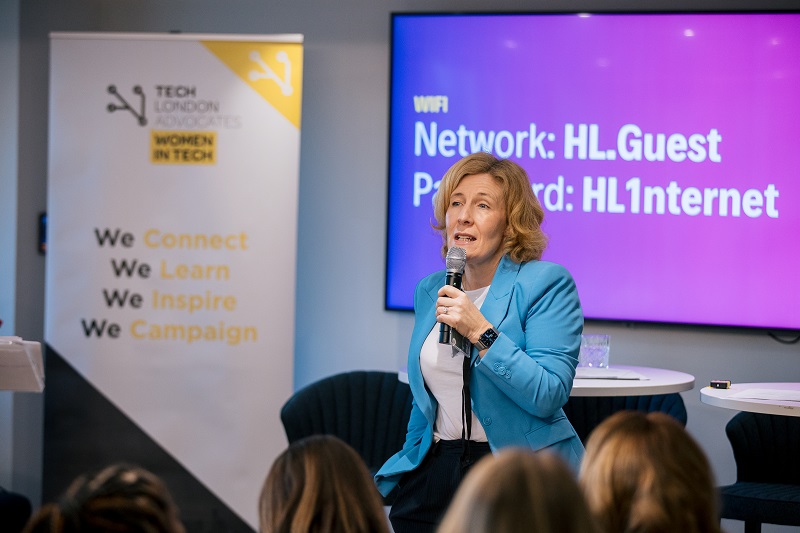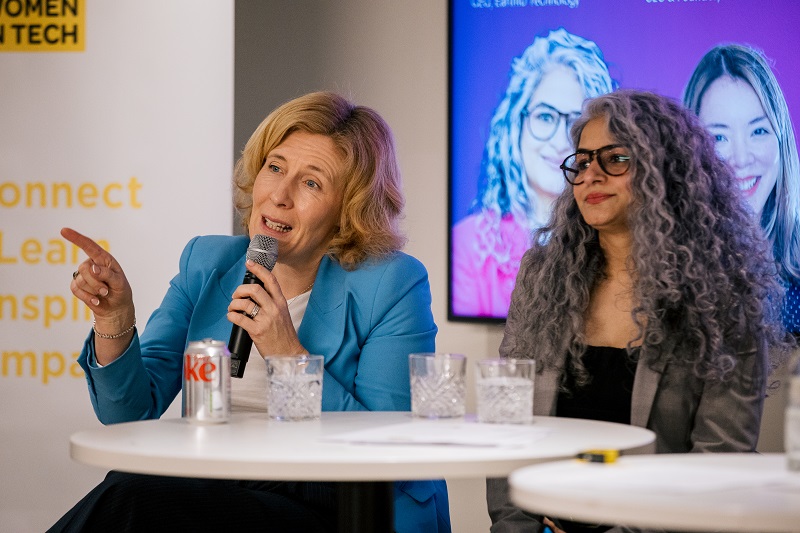The rapid evolution of artificial intelligence (AI), digital trust, and cybersecurity is transforming how organisations, governments, and regulators approach technology. Emma Wright, a leading expert in emerging tech law and regulation, sits at the heart of this shift, advising on the policies and frameworks that will define the future of responsible AI and data governance.
Emma recently shared her insights at the Women in Tech: Advancing Digital Trust panel discussion, where she explored the pressing regulatory challenges facing AI, online safety, and data protection. From the risks of data monopolies to the complexities of global governance, Emma emphasised the importance of striking a balance between innovation and regulation – ensuring the UK remains competitive while upholding high ethical standards.

Who is Emma Wright?
Emma Wright is an award-winning partner leading the Technology, Data, and Digital group at Harbottle & Lewis. She is an expert in AI and emerging technologies regulation, with considerable experience and a strong reputation for handling global telecom, cyber, and online regulatory matters. Companies and investors of all sizes seek her strategic counsel on governmental or regulatory issues.
Emma previously worked as a policy advisor in the UK Government and has practiced law on both sides of the Atlantic. She co-founded the Interparliamentary Forum on Emerging Technologies with Darren Jones MP, a global network of parliamentarians focused on sharing best practices for emerging technology regulation.
Emma is a founding member of UNESCO’s Women4EthicalAI, collaborates with the University of Oxford in its AI in Education Hub, and serves as a UNESCO Global Expert without Borders in AI regulation. She spearheaded the investHER campaign, which successfully reversed legislation that would have disproportionately impacted female angel investors and founders, reflecting her belief in inclusive participation to develop the best solutions for tomorrow.

Regulating AI Without Stifling Innovation
AI is advancing at an unprecedented pace, raising new questions about accountability, security, and ethical deployment. As a policy and legal expert, Emma understands the tension between supporting innovation and ensuring regulatory safeguards are in place.
“The speed of AI development is staggering, but over-regulation risks killing innovation. The key is creating frameworks that allow AI to flourish while maintaining public trust and safety.”
During the panel, Emma highlighted concerns around regulatory fragmentation across different jurisdictions. While the EU and US are taking distinct approaches, the UK must navigate these complexities carefully to remain a global leader in AI governance. She stressed the importance of ‘test-and-learn’ regulatory environments, such as sandboxes, to ensure that policies evolve alongside technological advancements rather than lagging behind them.
The Challenge of Data Monopolies and Digital Trust
One of Emma’s key messages during the discussion was the growing concern over data monopolies and the concentration of power among a few major tech players.
“We need to ensure that AI development isn’t dominated by a handful of companies controlling vast amounts of personal and commercial data. Responsible governance means fostering open competition, protecting user privacy, and ensuring critical data remains accessible for the public good.”
Emma advocated for the idea of ‘critical national data’—identifying datasets that are vital for economic growth, public safety, and innovation, and ensuring they are governed responsibly. She noted that while voluntary data-sharing initiatives can be effective, regulatory intervention may be necessary to prevent market imbalances and ensure ethical use of AI-driven insights.
Cybersecurity in the Age of AI
As AI becomes more embedded in critical infrastructure, cybersecurity risks are evolving in complexity and scale. Emma’s work in cybersecurity law focuses on ensuring businesses, governments, and regulators stay ahead of emerging threats.
“AI is both a powerful security tool and a potential risk. Bad actors are using AI to launch more sophisticated attacks, and organisations must ensure their defences evolve just as rapidly.”
At the event, Emma explored the dual role of AI in cybersecurity—how it can enhance threat detection and response while also introducing vulnerabilities. She highlighted the need for greater collaboration between policymakers, tech companies, and cybersecurity experts to ensure AI-driven security solutions remain robust, ethical, and resilient.

The Future of AI Regulation and Global Policy Alignment
Emma has been a strong advocate for international collaboration in AI governance, stressing that the UK must align with global best practices while tailoring regulation to its specific economic and security interests.
During the panel discussion, she underscored the importance of adaptive, evidence-based policymaking. Instead of rigid AI laws that may become obsolete as technology evolves, she supports a regulatory approach that prioritises ongoing consultation, industry engagement, and risk-based assessments.
“AI governance should be an iterative process. We need to create regulations that are flexible enough to adapt to new advancements while ensuring AI is developed and deployed responsibly.”
What’s Next? A Call for Proactive Regulation and Ethical AI Development
Emma’s contributions at the Women in Tech: Advancing Digital Trust event reinforced the urgency of addressing AI regulation, cybersecurity, and digital trust with a forward-thinking mindset. She called on industry leaders, policymakers, and technologists to work together in shaping AI’s future—one that is both innovative and responsible.
“The decisions we make today will define the AI landscape for decades to come. It’s up to us to ensure that innovation serves everyone, not just a select few.”
As AI regulation and cybersecurity challenges continue to evolve, Emma remains at the forefront of ensuring that policy keeps pace with progress. Progress that balances innovation, accountability, and digital trust.
